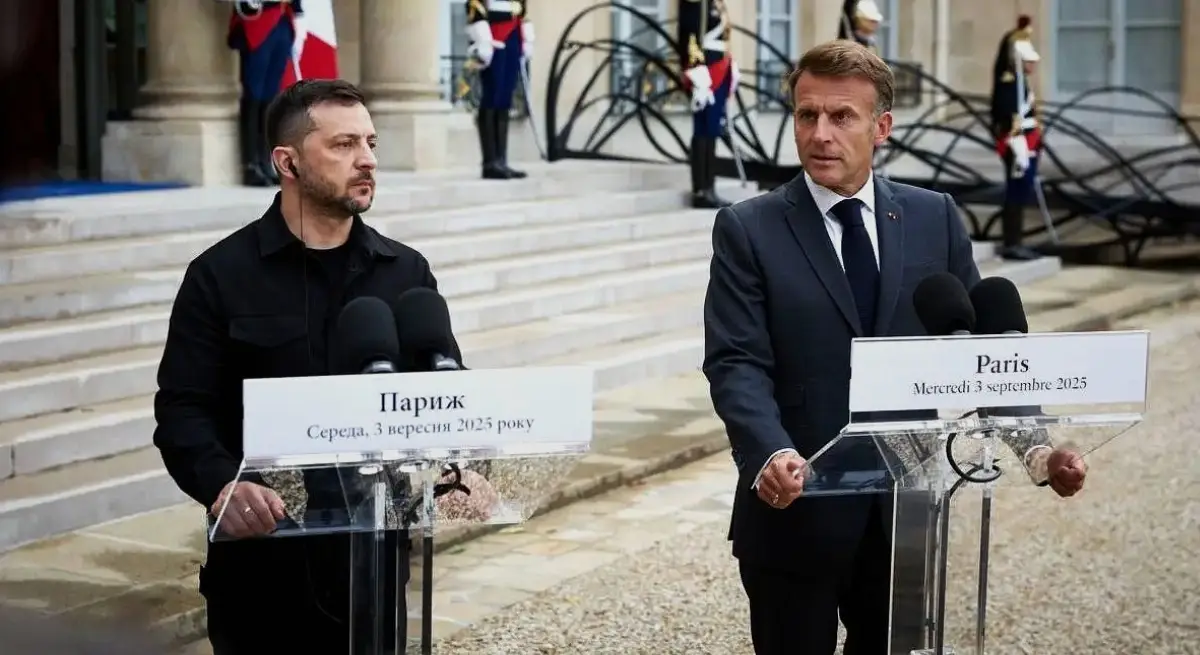
A united Europe for Kyiv's security: 26 countries adopt a post-conflict guarantees plan
Commitment by the "Volenterosi" to security on land, sea and air, with US support. The terms of the plan

Europe has united to forge a new security pact with Ukraine. After the historic meeting at the Élysée, which saw 26 countries commit themselves (for America, present Steve Witkoff), under the leadership of French President Emmanuel Macron and British Prime Minister Keir Starmer, and which also featured an intervention by Donald Trump, who joined by videolink to state the US position, an ambitious security guarantees plan was announced. The agreement, formalized yesterday on 4 September, was presented at a joint press conference by French President Macron and Ukrainian President Volodymyr Zelensky. Designed to enter into force "as soon as the guns fall silent", it aims to harden Ukraine against future aggressions, making it for Russia a "steel porcupine".
The three-tier strategy of the European plan
The strategy rests on three interconnected pillars, intended to provide 360-degree support to Kyiv. The first tier, dubbed the "steel porcupine", foresees unlimited cooperation between Ukraine and the West to arm Kyiv's military to the teeth. The objective is a long-term integration of the Ukrainian defense industry with the European one, backed by substantial funding to guarantee favourable loans. In this vision, Ukraine will become the main bulwark of continental defence against the Kremlin's imperial ambitions.
The second tier, known as "boots on the ground", foresees the deployment of a multinational contingent in Ukraine. Although the presence of troops at the front has been ruled out, discussion centred on a 20–25,000-strong "reassurance force" led by London and Paris, which would be positioned in the western part of the country, close to NATO supply lines. Italy and Poland have already made clear they will not send troops but will contribute in other forms, while Germany has reserved the right to decide "in due course". The Article 5-style NATO guarantees proposed by Italy fit into this scenario to further reassure Kyiv.
The third and final tier, Washington's so-called "backstop", underlines the indispensable role of the United States. Europe, with its armed forces weakened by decades of cuts to defence spending, cannot act alone. US operational support —through intelligence, satellites, drones and transport aircraft— is considered essential for the plan's implementation.
International reactions: from Trump to Moscow
The news has provoked mixed international reactions. US President Trump, as noted, participated in the meeting by videolink and made very clear the United States' willingness to be part of the plan. He also raised the stakes on the energy front, explicitly calling on Europe to stop buying Russian crude, which he described as a direct funding source for the war. That demand highlighted internal rifts within the coalition, with Hungary and Slovakia strongly opposing a halt to supplies.
Russia, for its part, strongly condemned the project. Deputy Foreign Minister Mikhail Galuzin reiterated that the deployment of European troops in Ukraine is unacceptable and expressed regret at the lack of willingness on the part of Kyiv and its backers to seek peaceful solutions.
Meanwhile, Moscow has tightened ties with Beijing: Russian President Vladimir Putin, on a visit to China for the summit of 31 August–1 September as part of the Shanghai Cooperation Organisation (SCO) summit in Tianjin — where he held bilateral meetings with Chinese President Xi Jinping and with North Korean leader Kim Jong-un, and where he also met Indian Prime Minister Narendra Modi, see AVIONEWS reports 1 and 2 — signed agreements for the supply of 106 billion cubic metres of gas per year, an enormous "alternative" to supplies for Europe.
While diplomacy works towards a future peace, the war on the ground unfortunately continues to claim victims. The road to formalizing the plan is still long, but the Paris agreement marks a significant step towards a new security architecture in Europe.
AVIONEWS - World Aeronautical Press Agency